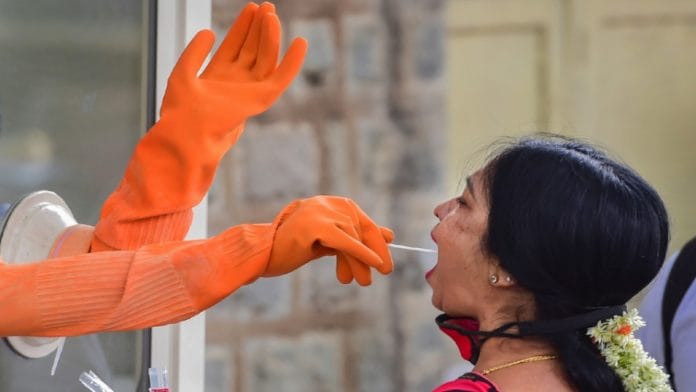New Delhi: While the link between Vitamin D and the Covid-19 infection is still unclear, a study from Spain has found that 80 per cent of Covid-positive patients in a hospital in Santander city were deficient in Vitamin D.
In a study, the authors noted that 25 hydroxyvitamin D (25OHD) or 25 hydroxycholecalciferol, which is produced in the liver and is the form in which Vitamin D is used in our body, were lower in hospitalised Covid patients.
“25OHD levels are lower in hospitalized COVID-19 patients compared to population-based controls and these patients had a higher prevalence of deficiency,” the study noted.
The study was published in the Journal of Clinical Endocrinology & Metabolism Tuesday.
The researchers looked at 216 Covid patients at the Hospital Universitario Marqués de Valdecilla and 197 population-based controls — those who did not have Covid — to analyse whether there is a link between the deficiency of the nutrient and the virus.
However, they did not find any link between the vitamin deficiency and severity of the disease. The study also noted that men had lower Vitamin D levels than women.
Also read: 5 ways in which Vitamin D can help prevent multiple organ damage from Covid
Previous studies recommend Vitamin D supplements for Covid
The link between Covid-19 and Vitamin D has been discussed since the beginning of the pandemic.
Some studies recommend taking Vitamin D supplements to prevent the infection, since multiple pathways link the two. This includes the fact that diabetic and obese people are more likely to be Vitamin D deficient and both are known comorbidities (chronic underlying health conditions) that can result in a severe form of the infection.
Vitamin D also has a role in the immune mechanism of the body.
A study by US researchers, published in the journal Clinical Medicine in July, said: “Low vitamin D levels have been associated with an increase in inflammatory cytokines and a significantly increased risk of pneumonia and viral upper respiratory tract infections.”
According to the study, the vitamin’s deficiency is also associated with increased thrombosis or blood clotting, which also occurs frequently in Covid patients.
“These conditions are reported to carry a higher mortality in COVID-19. If vitamin D does in fact reduce the severity of COVID-19 in regard to pneumonia/ARDS, inflammation, inflammatory cytokines and thrombosis, it is our opinion that supplements would offer a relatively easy option to decrease the impact of the pandemic,” the researchers added.
The authors of the Spanish study also noted that Vitamin D deficiency should be identified and treated, especially in high-risk individuals such as the elderly, those with comorbidities and nursing home residents.
“Vitamin D treatment should be recommended in COVID-19 patients with low levels of Vitamin D circulating in the blood since this approach might have beneficial effects in both the musculoskeletal and the immune system,” said study co-author José L. Hernández of the University of Cantabria in Santander.
Vitamin D deficiency is reportedly rising in many countries, including India, even though the best way for the human body to get its required dose of Vitamin D is by being in the sunlight, which helps the body synthesise the 25OHD.
Also read: Vitamin D deficiency, speech delay, dry eyes — the impact of ‘Covid lifestyle’ on children






